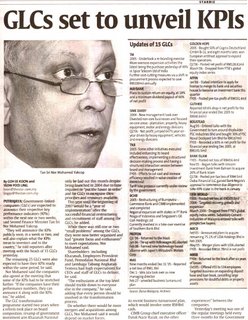
The StarBiz on GLC & KPI
NST News
Second Finance Minister Tan Sri Nor Mohamed Yakcop said that aLL the top 15 government-linked companies (GLCs) will announce their individual performance targets and the implications on both investors and the country in a week or two.
"KPIs need to be stretched a little, hence the challenge, and they need to meet them. And they (the GLC chiefs) say yes," Nor Mohamed told reporters after a meeting on GLCs restructuring in Putrajaya yesterday.
"One of the issues was the KPI. We all agreed that 2006 is a year of implementation. This year and next will be the year of execution and we have to build up the momentum," he said.
More GLCs suffered severe earnings projection cuts after recording disappointing results in the final quarter last year.
What KPIs? Is it Key Performance Indices? or, Key Program Indices? Will it be benchmark against the Industry best performers, at least regionally? Or, will it be some sort of corporate restructuring exercises to smoothen the eyes of the political master and carry on doing what had been done.
Let's wait and watch what sort of KPIs will be announced.
"KPIs need to be stretched a little, hence the challenge, and they need to meet them. And they (the GLC chiefs) say yes," Nor Mohamed told reporters after a meeting on GLCs restructuring in Putrajaya yesterday.
"One of the issues was the KPI. We all agreed that 2006 is a year of implementation. This year and next will be the year of execution and we have to build up the momentum," he said.
More GLCs suffered severe earnings projection cuts after recording disappointing results in the final quarter last year.
What KPIs? Is it Key Performance Indices? or, Key Program Indices? Will it be benchmark against the Industry best performers, at least regionally? Or, will it be some sort of corporate restructuring exercises to smoothen the eyes of the political master and carry on doing what had been done.
Let's wait and watch what sort of KPIs will be announced.
2 comments:
Hi GLC,
Thanks for your points expressed.
There's no question what is a KPI. But fundamentally, it is about measurement and measuring against something, some standards.
What standards? If a company is losing money, say, $1 million this year, and management set the KPI to breakeven next year. That's KPI too. So, in two years, the company perform one year losing money and the next to get back to even.
Another example: EPF used to pay 8% dividend 10 years ago. In the last 3 years, they are paying between 4-4.5% each year. So, they set a KPI to pay 5% next year (i.e. 2006). They achieved it. So, would you consider they succeed? So, if the management set mediocre standards and achieve it, would you consider they succeed? That's fallacious!
It is known to many and those in EPF that they could achieve 5% ROI within 6 months. Once they achieved it, they consolidate and cash out so as not to achieve too high an ROI. They are afraid that if they get say, 8-9% ROI, in 2006, then they will need to sustain this % for the next year and at a growth factor.
Hypothethically, GLCs will set a lower ROI as KPI so that they can sustain the need for continuous growth and keep their job.
That's what I am sounding...
GLC,
You are right. The hypothesis is: does a better KPI translate the company's result to mean they had done better. Your example of TNB is great. They did better because of the increase tariff and the rakyat is the one that contributed to their KPI; not their employees.
Similarly, it goes for PLUS, Telekom, and utility companies, not forgeting EPF that basically is not in a competitive zone. All they need is to achieve 5%; that's all. That's pretty easy, like it or not.
Another important point is continuous growth and sustainability. We got to talk about it later.
Post a Comment